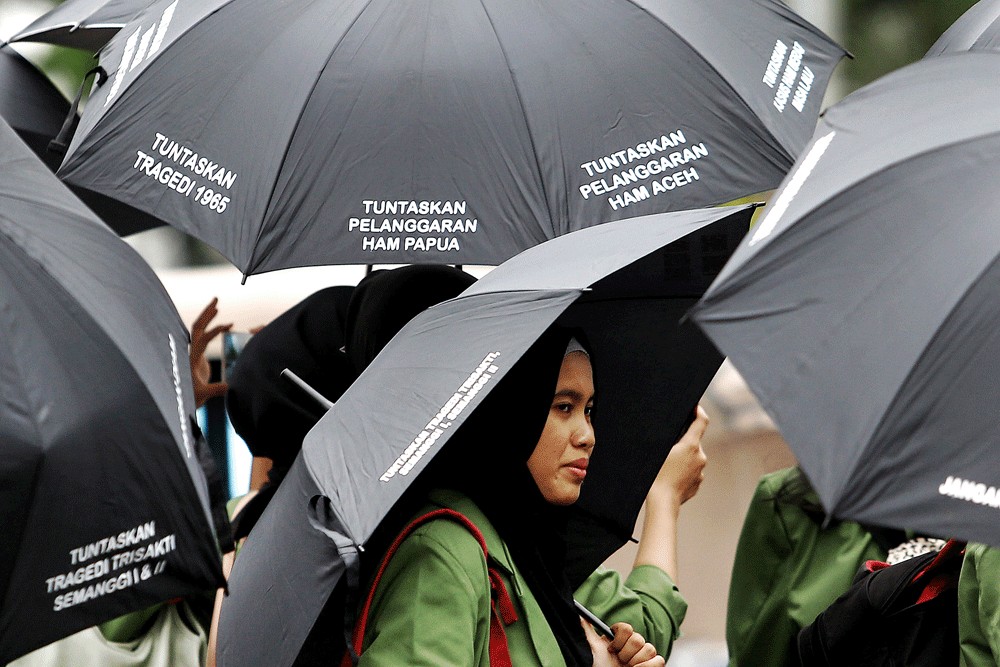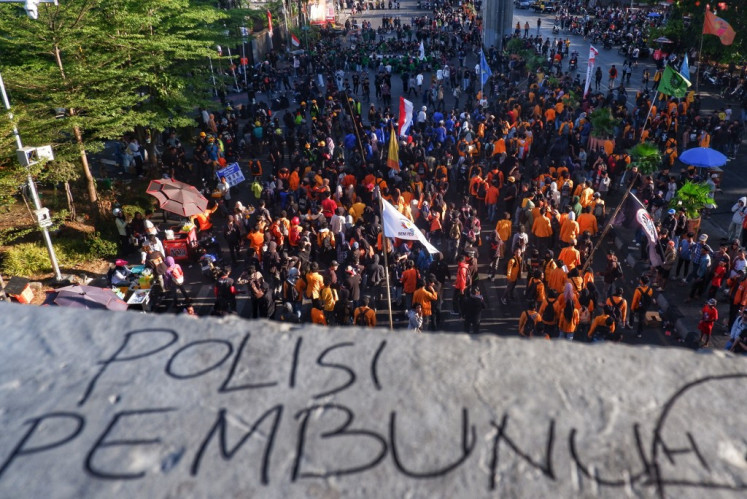Popular Reads
Top Results
Can't find what you're looking for?
View all search resultsPopular Reads
Top Results
Can't find what you're looking for?
View all search resultsIndonesia holding back on UN review of rights record
Observers question selective uptake of recommendations.
Change text size
Gift Premium Articles
to Anyone
Progress on the peer review of Indonesia’s human rights record at the United Nations Human Rights Council this year has been hampered by lack of enforcement and ambition, although the delegation in Geneva, Switzerland has shown support of the many recommendations made by fellow UN member countries in the latest Universal Periodic Review (UPR) cycle held last week.
Specifically, rights groups have argued that the protection of civic space remains a big unanswered question, with the selective choice of supported recommendations and a lack of firm enforcement of previously supported ones are among the issues worth noting this year.
Last week, the UN Human Rights Council adopted Indonesia’s fourth cycle UPR Report at the council’s 52nd session in Geneva.
Indonesia’s deputy permanent representative to the UN in Geneva, Grata Endah Werdaningtyas, said that Indonesia supported 205 recommendations, took note of 59 recommendations and partially supported five recommendations it had received during the peer review of Indonesia’s human rights record.
She said that this time Indonesia supported 74 percent more recommendations it had received from UN member countries than during the previous cycle.
“This is not only progress, but also testament to the Indonesian government’s firm commitment to improving and ensuring the rights of its citizens,” Grata said in a statement last Tuesday.
However, rights groups still voiced concern as to how serious Indonesia is in handling these recommendations, especially the ones it only took note of, as this usually means that the government does not necessarily agree with them and offered no commitment to implementing them.
In a joint statement from Amnesty International Indonesia and the Alliance of Independent Journalists (AJI), the groups expressed regret that Indonesia only took note of the eight recommendations on freedom of expression and human rights defenders, instead of supporting them.
The groups also pointed out that Indonesian authorities kept pushing forward on the defamation proceedings against two human rights defenders, Fatia Maulidiyanti and Haris Azhar, for criticizing a senior minister and government policies.
“We urge the government to implement recommendations on the protection of freedom of expression, association and peaceful assembly, including freedom of the press,” AJI chairman Sasmito Madrim said recently.
The groups lauded Indonesia for supporting the recommendations to ratify the Optional Protocol to the Convention against Torture and Other Cruel, Inhuman or Degrading Treatment or Punishment (OP-CAT) and the International Convention for the Protection of All Persons from Enforced Disappearance (ICPPED).
However, the groups criticized Indonesia for still declining to ratify the Rome Statute.
“We encourage Indonesia to reverse its position on noted recommendations and to implement supported recommendations as soon as possible,” Amnesty International Indonesia executive director Usman Hamid said.
Separately, Commission for Missing Persons and Victims of Violence (KontraS) deputy coordinator for advocacy Tioria Pretty said that some of the recommendations given to Indonesia such as ratifying the ICPPED and ending impunity for past gross human rights violations had been repeatedly recommended in the previous UPR cycles as well.
“However, despite Indonesia saying it supported those recommendations, it still has not truly implemented them,” Tioria said in an online discussion on Wednesday.
She also regretted that Indonesia still avoided ratifying the Rome Statute, as Indonesia is seemingly unwilling to resolve past gross human rights violations at court, with almost all defendants brought to trial at Indonesia’s ad hoc human rights court being acquitted.
Meanwhile, ASEAN SOGIE Caucus advocacy officer Lini Zurlia said that there were improvements in the fourth UPR cycle, Indonesia supported eight of 13 recommendations on LGBT rights as discrimination against LGBT groups is still rife in the country.
She also pointed out that discrimination against LGBT groups had shifted in terms of its procedures from blatant criminalization to discriminatory bylaws against LGBT groups with the smokescreen of “curing” them from being LGBT.
“The central government has not been able to stop those efforts [that discriminate against LGBT groups] through its national policies,” Lini said on Wednesday, adding that the new Criminal Code could also legitimize discrimination against LGBT with the living law provisions in the code.










